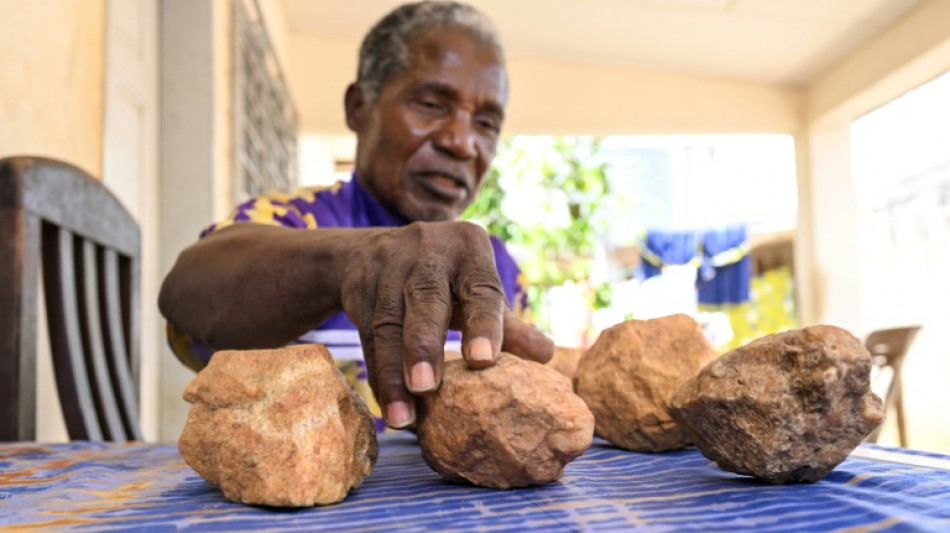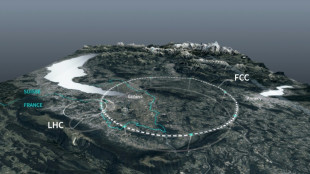
-
 Australia's Head fires quickfire 68 as England's Ashes hopes fade
Australia's Head fires quickfire 68 as England's Ashes hopes fade
-
Conway falls for 227 as New Zealand declare at 575-8 in West Indies Test

-
 Japan hikes interest rates to 30-year-high
Japan hikes interest rates to 30-year-high
-
Brazil's top court strikes down law blocking Indigenous land claims

-
 Conway falls for 227 as New Zealand pass 500 in West Indies Test
Conway falls for 227 as New Zealand pass 500 in West Indies Test
-
'We are ghosts': Britain's migrant night workers

-
 Asian markets rise as US inflation eases, Micron soothes tech fears
Asian markets rise as US inflation eases, Micron soothes tech fears
-
Giant lanterns light up Christmas in Catholic Philippines

-
 TikTok: key things to know
TikTok: key things to know
-
Putin, emboldened by Ukraine gains, to hold annual presser

-
 Deportation fears spur US migrants to entrust guardianship of their children
Deportation fears spur US migrants to entrust guardianship of their children
-
Upstart gangsters shake Japan's yakuza

-
 Trump signs $900 bn defense policy bill into law
Trump signs $900 bn defense policy bill into law
-
Stokes's 83 gives England hope as Australia lead by 102 in 3rd Test

-
 Go long: the rise and rise of the NFL field goal
Go long: the rise and rise of the NFL field goal
-
Australia announces gun buyback, day of 'reflection' after Bondi shooting

-
 New Zealand Cricket chief quits after split over new T20 league
New Zealand Cricket chief quits after split over new T20 league
-
England all out for 286, trail Australia by 85 in 3rd Test

-
 Australian announces gun buyback, day of 'reflection' after Bondi shooting
Australian announces gun buyback, day of 'reflection' after Bondi shooting
-
Joshua takes huge weight advantage into Paul fight

-
 TikTok signs joint venture deal to end US ban threat
TikTok signs joint venture deal to end US ban threat
-
Conway's glorious 200 powers New Zealand to 424-3 against West Indies

-
 WNBA lockout looms closer after player vote authorizes strike
WNBA lockout looms closer after player vote authorizes strike
-
Honduras begins partial vote recount in Trump-dominated election

-
 Nike shares slump as China struggles continue
Nike shares slump as China struggles continue
-
Hundreds swim, float at Bondi Beach to honour shooting victims

-
 Crunch time for EU leaders on tapping Russian assets for Ukraine
Crunch time for EU leaders on tapping Russian assets for Ukraine
-
Pope replaces New York's pro-Trump Cardinal with pro-migrant Chicagoan

-
 Trump orders marijuana reclassified as less dangerous drug
Trump orders marijuana reclassified as less dangerous drug
-
Rams ace Nacua apologizes over 'antisemitic' gesture furor

-
 McIlroy wins BBC sports personality award for 2025 heroics
McIlroy wins BBC sports personality award for 2025 heroics
-
Napoli beat Milan in Italian Super Cup semi-final

-
 Violence erupts in Bangladesh after wounded youth leader dies
Violence erupts in Bangladesh after wounded youth leader dies
-
EU-Mercosur deal delayed as farmers stage Brussels show of force

-
 US hosting new Gaza talks to push next phase of deal
US hosting new Gaza talks to push next phase of deal
-
Chicago Bears mulling Indiana home over public funding standoff

-
 Trump renames Kennedy arts center after himself
Trump renames Kennedy arts center after himself
-
Trump rebrands housing supplement as $1,776 bonuses for US troops

-
 Harrison Ford to get lifetime acting award
Harrison Ford to get lifetime acting award
-
Trump health chief seeks to bar trans youth from gender-affirming care

-
 Argentine unions in the street over Milei labor reforms
Argentine unions in the street over Milei labor reforms
-
Trump signs order reclassifying marijuana as less dangerous

-
 Famed Kennedy arts center to be renamed 'Trump-Kennedy Center'
Famed Kennedy arts center to be renamed 'Trump-Kennedy Center'
-
US accuses S.Africa of harassing US officials working with Afrikaners

-
 Brazil open to EU-Mercosur deal delay as farmers protest in Brussels
Brazil open to EU-Mercosur deal delay as farmers protest in Brussels
-
Wounded Bangladesh youth leader dies in Singapore hospital

-
 New photo dump fuels Capitol Hill push on Epstein files release
New photo dump fuels Capitol Hill push on Epstein files release
-
Brazil, Mexico seek to defuse US-Venezuela crisis

-
 Assange files complaint against Nobel Foundation over Machado win
Assange files complaint against Nobel Foundation over Machado win
-
Private donors pledge $1 bn for CERN particle accelerator


Ivory Coast's epochal prehistoric finds pass unseen
In the streets of Anyama, children play and braziers smoke on corners. There is little to show that the ground of this everyday Ivory Coast neighbourhood conceals seminal prehistoric treasures.
Near the local storefronts lies the site of an excavation that unearthed stone tools from 150,000 years ago -- the earliest sign ever of humans inhabiting a tropical forest.
"That's interesting," said Ruth Fabiola Agoua, 25, who keeps a shop with her mother yards from the spot, north of the Ivorian economic capital, Abidjan.
"You cannot live without knowing your history."
- Ages of man -
Homo sapiens emerged in Africa 300,000 years ago but were once thought to have colonised tropical forests only 70,000 years back at the most.
After dating the findings from Anyama, researchers from Ivory Coast and several other countries concluded in a study that humans were living in such an environment at that spot 150 millennia ago.
By analysing biological traces and sediments, the study revealed the place was "a wet forest environment" at the time when the tools were deposited there.
"The results represent the oldest yet known clear association between humans and this habitat type," they wrote in their paper, published in the journal Nature last month after years of research.
"The secure attribution of stone tool assemblages with the wet forest environment demonstrates that Africa's forests were not a major ecological barrier" for homo sapiens at that stage.
- Tool boxes -
Among the study's authors was retired Ivorian archaeologist Francois Guede Yiode, 77 -- considered by colleagues to be the only qualified prehistory specialist in the country.
He started excavating on the privately owned land in 1982 after being alerted to the remains by a geologist.
Eventually, he and the study's co-authors got several metres below the surface, finding tools from the pleistocene epoch, which stretched from some 2.5 million to 12,000 years ago.
"The picks were used to cut up materials," he said. Other tools, dubbed "choppers", had a sharp edge for cutting through animal skin.
Today, despite the findings they inspired, the tools themselves lie hidden in boxes stacked in a small room in Guede Yiode's modest house -- a sign of what he bitterly calls the state's "lack of will" to help.
Despite a growth in research over the past 15 years, here "archaeology is a science that is slow in publishing findings because it is not funded", he said.
The artefacts and biological remains found in Anyama were analysed in German laboratories and part of the research was funded by European universities and institutes.
The Ivorian archaeologist said he provided 15 million Central African francs (currently $25,000) from his own pocket to fund the first few years of excavations at Anyama.
- Past and present -
Now Guede Yiode and his colleagues hope the finds will boost archaeology in Ivory Coast.
"There are several sites in Ivory Coast where you could perform archaeological excavations and studies on the palaeolithic period," said another of the study's authors, Eugenie Affoua Kouame, a researcher at Ivory Coast's Institute of African History, Art and Archaeology.
Guede Yiode said he has been trying in vain to have the cache of tools displayed in a museum for public and researchers to see.
"I don't feel comfortable having it all in my house."
A local anthropology undergraduate, Akissi Diane Guebie, said she hoped the Nature study would "encourage students to specialise in these subjects".
Walking to work in Anyama, local security guard Basile Sawadogo, 51, seemed unmoved by the closeness of prehistory, however.
"We live in the present," he said.
M.Odermatt--BTB




